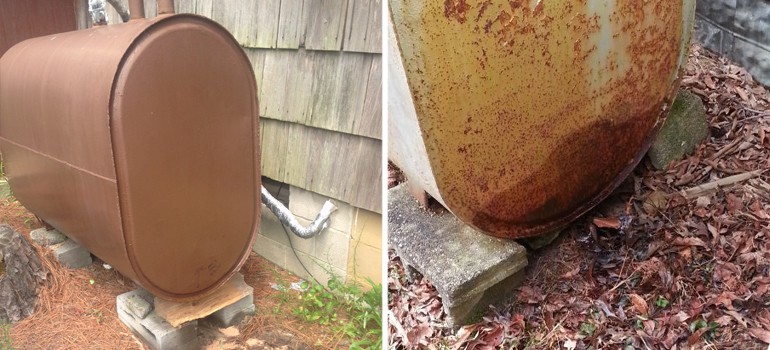Risks of buried oil tanks.
Is my underground oil tank leaking.
Outdoor oil tank leak.
Indoor oil tank leak.
If you notice a pronounced smell of oil in your home or around your property it is a good indication that you have an underground oil tank leak.
First if your oil tank sprouts a leak the cost of cleaning the contaminated soil and water can stretch into thousands of dollars.
Even larger tanks that were specifically designed for underground use will leak if they are not protected from corrosion.
Even if the tank is not leaking now and has not already leaked if there is an old buried steel tank at a property you should plan on replacing it before it leaks not afterwards.
The risks of an underground oil tank range from environmental and legal to financial and health related.
These tanks were not designed to be buried and if left in place will eventually corrode and leak.
If you smell oil and you see it on the floor near or beneath the tank during a visual inspection you know you have a leak.
There are dead plants above your oil tank.
It is relatively easy to detect an indoor oil tank leak.
A typical leaking underground storage tank lust scenario involves the release of a fuel product from an underground storage tank ust that can contaminate surrounding soil groundwater or surface waters or affect indoor air spaces.
Further monitoring must be given to underground oil tanks as the leak is more unnoticeable when the tank is below the ground.
If an underground oil tank at a property is 15 20 years old the chances of a leak are high and you need to have the tank tested.
Insurance may only cover a portion of these costs further increasing your risk.
A good indication of an oil tank leak is if the vegetation over your oil tank is dying.
Oil tanks can be found underground or above the ground.
If you have an underground oil tank your risk of having an oil leak is high and whether you have one now or end up having one later the cost of cleaning up contaminated soil and water sources ranges from thousands to hundreds of thousands of dollars.
If the weather has not undergone extreme changes yet the heating bill has begun to rise it is possible that oil is beginning to seep from the tank.
A key point that people overlook if any oil is found at the burial depth of a tank the tank is leaking.
Regardless of where it is located homeowners must exercise due diligence for the maintenance of the oil tank.
If you notice this smell it is of the utmost importance that you address the leak as soon as possible because if it continues it could affect the health and well being of you and your family.
Soil sampling around an oil tank is one of if not the most reliable way to evaluate an oil tank for leaks.
The first clue that a homeowner has in discerning if their oil tank is leaking is a sudden change in the heating bill.
If you notice an unexplainable increase in your home heating oil use your tank may be leaking.

